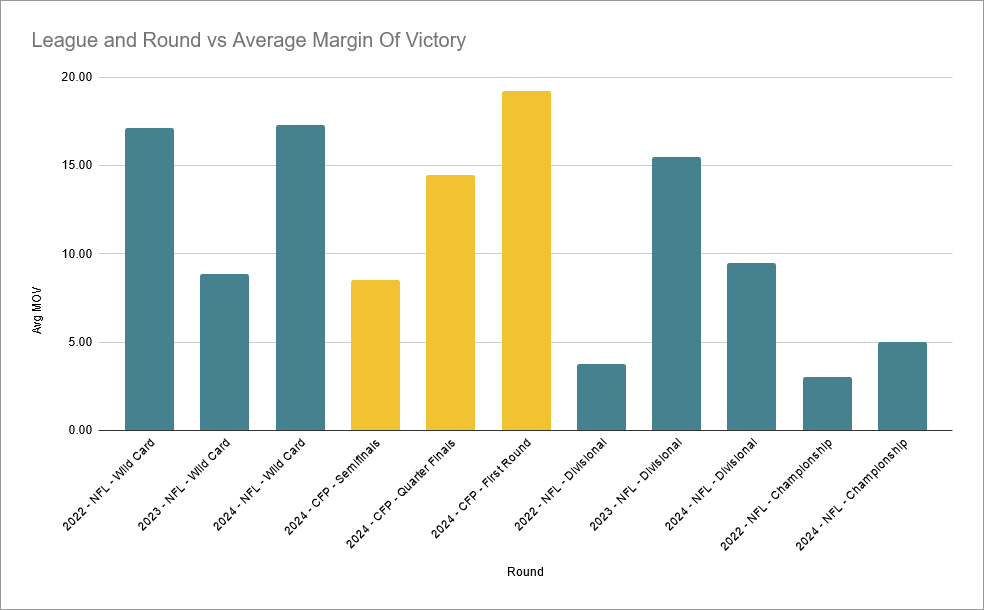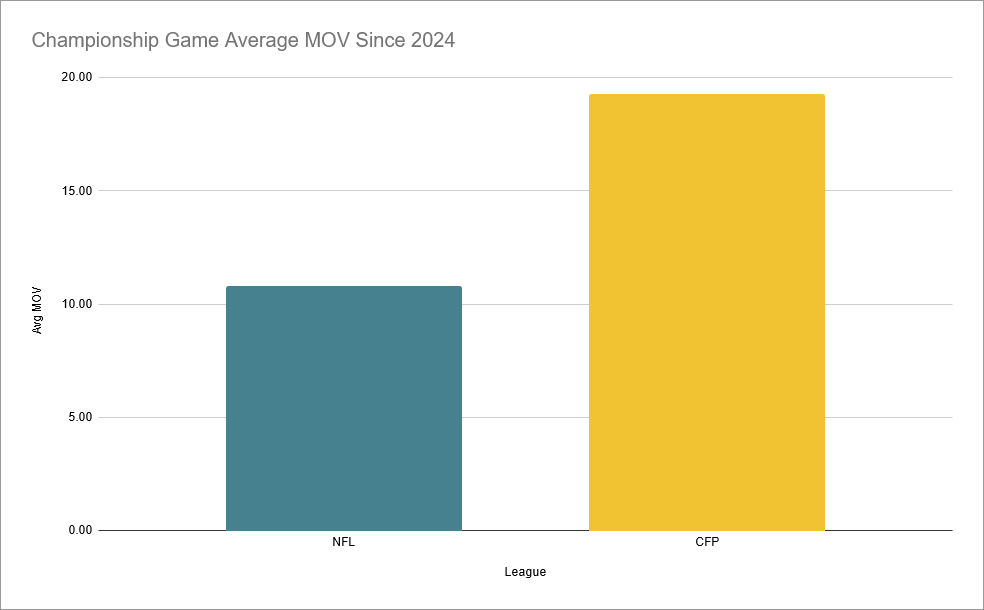Playoff Blowouts Don’t Make College Football Unfun, The Media Constantly Whining Does
Before the twelve-team playoff even kicked off, there was an immediate wave of consternation by media pundits hemming and hawing about seeds, snubs, and slights.
Their contempt for the sport and banal hand wringing only continued from there.

The committee (this year at least), and average fan seem to value winning games or winning your conference fairly highly. They want to see winning teams play winning teams.
Moral victories and ill-defined eye tests don’t mean a whole lot to them. Especially casual fans. However, a guaranteed path to play for a championship—something that never existed before—certainly does.
And yet, if you turned on your TV, went on Twitter (I’m not calling it X), or opened your favorite sports blog, there was a good chance you’d be met with a deluge of criticisms by talking head types. All squabbling over things like a snub to Alabama as if the committee randomly put the Wyoming School for the Blind in over them. When in reality, it was SMU.
Other hot topics include things like “Does Boise State really deserve a bye?” or “Why does Ohio State deserve such an awful path?”
Then there was whatever Lane Kiffin was kvetching about.
The people who are the tastemakers, the trendsetters, and controllers of the cultural conversation surrounding the sport primed the pump from moment one with overwhelming amounts of negativity.
A frankly gross and off-putting way to start what is supposed to be a new era of a fairer path for all to possibly win a national championship.
At a time when you should be drawing in both hardcore and casual fans with the excitement of an expanded playoff format—featuring new storylines and faces—you’re instead telling them they’re getting a diluted product. It’s no wonder some fans (especially new ones) would be turned off by the constant infighting.
The media, schools, and conferences should frankly do better. Don’t deride and quibble over every detail. Save it for the off-season.
Instead talk about the great matchups you’ve got, the who’s who of the season. Make it known why it’s fun to be in the big tent that is college football. Be the adults in the room. Be the good stewards of the sport — champions of its uniqueness and fun.
Blowouts…
All this negativity came before the first round even kicked off.
Once they finally did, you’d have thought the outcomes of these matchups, and the fact that they were even made in the first place, had ushered in the decline of Western civilization as we know it.
“Blowout this,” “boring that,” “margin of victory” whatever-type statements dominated the conversation.
Kirk Herbstreit introduced us to the idea of the “lunatic fringe” and suggested that the desires of the fans to value wins and losses simply shouldn’t matter:
On @SportsCenter last night, @KirkHerbstreit takes a stand. Do you agree? pic.twitter.com/OFCbboT4QH
— Linda Cohn (@lindacohn) December 22, 2024
Greg Sankey made semi-snide remarks that this must immediately be remedied. And that the CFP directors will have a meeting on all this to decide the best way forward. Because, in essence, a team like Boise State should never have a bye. Almost assuredly, in his eyes, a random middle-of-the-road SEC team should get a better path just by virtue of existing in the right conference. Perhaps the likes of Boise State shouldn't even be there at all.
The prevailing narrative underpinning all of this is that blowouts aren’t fun, people don’t want to watch them, they hurt the sport, drive away fans, and diminish TV revenues.
However, the metrics we have so far would indicate that this is simply not true.
As pointed out by *The Athletic*, viewership of each round grew over the previous. The games drew an average of 10.6 million, 16.9 million, and 19.2 million viewers, respectively. Notably, last year’s semifinals delivered bigger ratings, with a 27.7 million viewer on average. Carried by the Alabama vs. Michigan Rose Bowl matchup.
Wide ratings swings are not an anomaly in the College Football Playoff however. According to Sports Media Watch data, the average semifinal viewership sits closer to 19 million viewers, making this year pretty “normal.”
On the note of actual scoring... The average margin of victory in any given round of this year’s College Football Playoff is not an extreme outlier compared to the early rounds of the last few years' NFL playoffs.

* Championship indicates conference championship. Not the Super Bowl.
With the NFL typically not seeing significant score tightening until the conference championships.
As for the championship games in both leagues since 2014; the CFP Final has had a wider margin on average than any of these early rounds we’ve heard so much about. With an average margin of victory sitting at 19.27 points.

Even if you eliminate the particularly nasty Georgia vs. TCU championship game the margin drops to around two touchdowns on average. Meanwhile, the average Super Bowl margin of victory is just shy of 11 points.
Ultimately, the margins of victory and competitiveness of these games aren’t the problem. The NFL doesn’t blow it all up over their comparatively similar playoff outcomes.
The perceptive difference between the two leagues is night and day, even if playoff outcomes are similar.
The NFL spends basically the entirety of their playoffs telling everyone how great the NFL is. Why you should want to be a part of this awesome competition they’ll be putting on for the next four(ish) weekends. They make it known this is where their best teams square off for dominance.
The college football media machine right out of the gate effectively sets the stage to be mad and disappointed about what happens. In some ways, they almost seem mad this is happening at all because it eliminates their ability to crown some pre-ordained media darling a champion. Rarely does anyone say to the average fan, “Hey, this will be really fun. You should come along.”
Blowouts in the College Football Playoff don’t make it an unfun viewing experience, but the constant negativity of the pundits with the loudest voices sure does.
Anway... follow me on Bluesky for future hot takes. I'm working on one now for how Valve shouldn't be exempt from criticism.